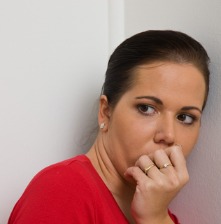|
Types of PhobiasTypically, these feelings of dread and fear interfere with your daily life. When you are exposed to the object or specific situation you would experience severe anxiety such as panic anxiety attacks, increased heart rate, sweating profusely, etc. (Anxiety Self Help For Sweating) Because of this heightened anxiety, you avoid the object or situation at all costs and it begins to affect your daily activities.
If you have a phobia, For example, if your specific phobia is a fear of dogs, you would avoid going outside alone on the remote possibility that there may be a dog out there. Many phobia sufferers become house bound because it is their only "safe zone" and phobias can occur along with other anxiety disorders. Some common things to look for with all types of phobias are: * When you encounter the object or situation, you start to sweat or tremble or have a overwhelming feeling of doom * You know your fear is irrational, but you can't seem to control it * Your fear is overwhelming, controlling your thoughts * It affects your daily activities, when you decide where to go and what to do, you always think of your phobia first, whether your actions will put you in contact with your phobia, and you go to great lengths to avoid it. We all have an irrational fear or two. Some get nervous at the thought of needles, others scream at the sight of a mouse, and alot of people get dizzy looking down from tall buildings. However, as you see above, a phobia extends far beyond that. You can have a phobia of pretty much anything, but here are some examples of specific types of phobias: * Agoraphobia--Fear of public places or going outside. You are afraid of being trapped in a public place, on a bridge, or in a line at a bank, and not able to get out. This phobia affects twice as many women as men and is by far the most common phobia. Take this
agoraphobia test.
* Natural Environment Phobias--Fears caused by objects found in nature. Examples include: fear of heights, fear of thunder or storms, fear of germs, fear of water, fear of the dark. * Situational Phobias--Fears triggered by a specific situation. Examples include: fear of enclosed spaces (claustrophobia), fear of elevators, fear of flying, fear of dentists, fear of driving, fear of tunnels, and fear of bridges. * Blood-Injection-Injury Phobia--Fear of blood, fear of injury, fear of getting cancer, fear of shots or other medical procedures, fear of death. * Other types of phobias that don't really fall into any category can include: Fear of clowns, fear of choking, fear of the number 13, fear of ghosts, fear of vampires or bats, fear of vomiting, fear of the unknown, fear of the future, and last but not least, fear of fear itself (just the thought of being afraid may freak you out). If you do feel you have a phobia, please know you are not alone. We are under stress every day and it is impossible not to be affected by it to some degree. Emotionally, we just all respond differently, that's all. Phobias can be linked to other types of anxiety disorders. For example if the phobia is caused by a traumatic event, it is linked to
Post Traumatic Stress Disorder.
If you are afraid of social situations, it is closely linked to
Social Anxiety Disorder or Social Phobia.
But please know that you CAN learn to overcome your fears with the right treatment. You may find some helpful information in the Anxiety Self Help section for some ideas that may help your phobia as well as suggestions to reduce your anxiety levels. Exit Types of Phobias and |





